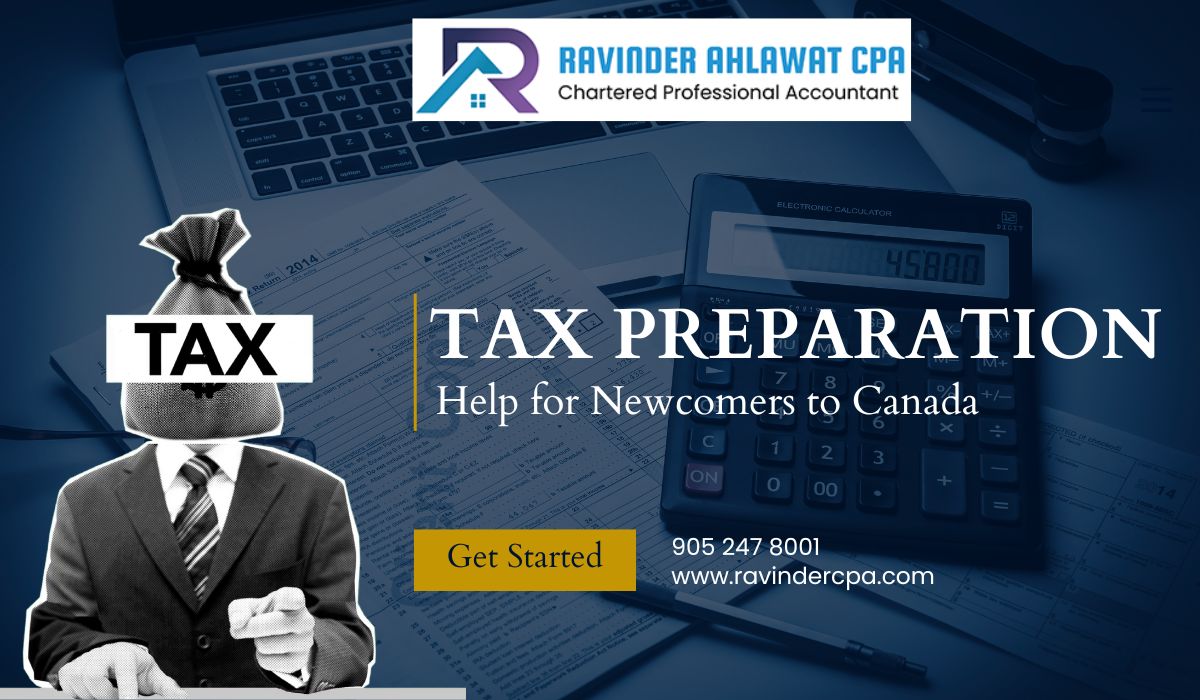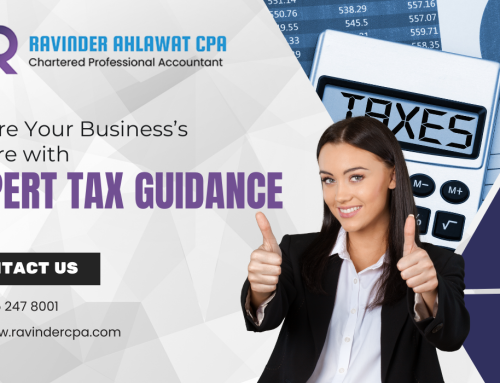Canada welcomes people from across the globe, and starting a new chapter here means getting familiar with essential responsibilities, one of the most important being your income tax filing. For newcomers, filing an income tax return in Canada for the first time can be overwhelming. But understanding your tax obligations is not just about staying compliant with the Canada Revenue Agency (CRA)—it also allows you to access valuable tax credits and government benefits.
That’s where working with a Chartered Professional Accountant (CPA) makes a real difference. Whether you’re looking for a personal tax accountant, taxation service provider, or simply need reliable tax preparation, we’re here to help. Ravinder Ahlawat, CPA, is a trusted professional accountant who specializes in helping new Canadians with everything from residency questions to complete income tax return filing. At our accounting firm, we simplify the process and ensure your tax return is accurate, compliant, and optimized for your situation.
This guide will walk you through the key steps of your first Canadian tax filing, with insight into how our accountants can support you every step of the way.
Who Needs to File an Income Tax Return in Canada?
Even if you are new to the country, you may still be required to file a tax return. In Canada, your obligation to file is based on your residential ties, not just your immigration status. If you have established a home, job, or close family ties here, you are generally considered a resident for tax purposes from the date of your arrival.
You are expected to file a return if you:
- Earned employment, rental, or investment income in Canada,
- Wish to claim a tax refund for overpaid taxes,
- Want to receive benefits like the GST/HST credit or Canada Child Benefit, or
- Need to report global income earned after becoming a Canadian tax resident.
Even if you had no income in your first year, filing your return helps you build eligibility for future tax benefits. A tax accountant can advise you on what to file and when.
When Is the Deadline for Tax Filing?
Most individual taxpayers must file by April 30 of the following year. If you or your spouse/common-law partner are self-employed, your deadline is extended to June 15—although any taxes owed are still due by April 30.
Missing these deadlines can result in late filing penalties and interest. Filing your taxes on time with help from a personal tax accountant ensures your benefits are not delayed and any potential refunds are received promptly.
What Documents Do You Need for Tax Preparation?
Getting organized is the first step in stress-free tax preparation. You’ll need:
- A valid Social Insurance Number (SIN)
- T4 slips (employment income)
- T5 slips (interest and investment income)
- T2202 (if you paid tuition)
- Receipts for rent, childcare, medical expenses, and charitable donations
- Details of any foreign income or property after arrival in Canada.
A professional accountant can review your documents and help identify deductions or credits you may be eligible for—something many newcomers miss when filing on their own.
Understanding the Canadian Tax System
Canada uses a progressive tax system, meaning your tax rate increases as your income rises. Taxes are collected at both the federal and provincial levels, and residents must report all worldwide income earned after becoming a Canadian resident.
Our accountants can help you reduce your taxable income through:
- Deductions (such as RRSP contributions or moving expenses),
- Non-refundable and refundable tax credits (like tuition or the basic personal amount).
As a taxation service provider, we explain your options and help you make smart financial choices.
Benefits and Credits You May Be Eligible For
Filing your first income tax return opens the door to various government credits and support programs. These include:
- GST/HST Credit: A tax-free quarterly payment for low to moderate-income households.
- Canada Child Benefit (CCB): A monthly benefit for families with children under 18.
- Tuition Tax Credit: For post-secondary students.
- Climate Action Incentive: Available in some provinces to offset environmental levies.
Our tax filing services ensure these benefits are accurately calculated and applied for on your behalf.
How to File Your Taxes in Canada
You can file in several ways:
- Online using NETFILE-approved software,
- Mailing a paper return, or
- Working with a CPA or personal tax preparer.
First-time filers often benefit most from the guidance of an experienced tax preparer. At our firm, we offer personalized personal taxation services to make your first return accurate and stress-free.
Common Tax Mistakes to Avoid
Many newcomers make avoidable errors such as:
- Misunderstanding residency status,
- Forgetting to report foreign income or assets,
- Failing to claim eligible tax credits,
- Missing CRA deadlines.
A licensed business accountant or CPA will ensure your return complies with all CRA rules and is filed correctly the first time.
Filing with Confidence: Work with a Chartered Professional Accountant
Navigating your first income tax filing in Canada can feel overwhelming, but with the guidance of a Chartered Professional Accountant, you don’t have to figure it out alone. From determining your tax residency to preparing and submitting your return, our team ensures the process is accurate, efficient, and tailored to your unique situation.
At our accounting firm, we provide trusted support for newcomers, individuals, and small business owners. Whether you’re in need of a reliable taxation service provider in Mississauga or seeking a personalized personal taxation service in Brampton, we’re here to help you stay compliant and make the most of available tax benefits.
Need expert help filing your first Canadian tax return?
Get in touch with Ravinder Ahlawat, CPA—your trusted personal tax accountant in Brampton. Call 905-247-8001 or email ravinder@ravindercpa.com to book your consultation. Let our experienced accountants take care of the numbers while you focus on building your new life in Canada.




Leave A Comment